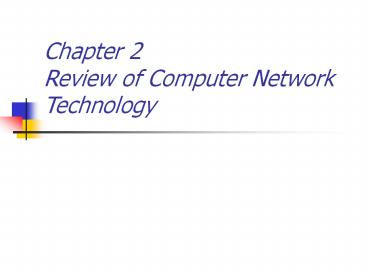Chapter 2 Review of Computer Network Technology - PowerPoint PPT Presentation
Title:
Chapter 2 Review of Computer Network Technology
Description:
Modified token ring protocol. Data rate 100 Mbps ... Multi-protocol. Refer to Figure 2.17, page 77. Bridges. Operates at Layer 2, the data link layer. ... – PowerPoint PPT presentation
Number of Views:205
Avg rating:3.0/5.0
Title: Chapter 2 Review of Computer Network Technology
1
Chapter 2Review of Computer Network Technology
2
Outline
- Network Topology
- Local Area Networks
- Network Node Components
- Internet TCP/IP Protocols
- Refer to net-inrtro.ppt
- Transmission Technology
3
Network Topology- LAN Topology
Star
Bus
Ring
4
A Campus Network Of LANs
5
Network Topology- WAN Topology
Mesh
Tree
6
2. Local Area Network
- Type of LANs
- Ethernet
- Fast Ethernet
- Gigabit Ethernet
- Half-duplex Vs Full-duplex
- Switched Ethernet
- VLAN (Virtual LAN)
- Token Ring
- FDDI
7
Ethernet
- IEEE 802.3 standard
- 10 Mbps data rate
- CSMA/CD
- Carrier Sense Multiple Access with Collision
Detection - Analogy of a hollow pipe
- Back Off Algorithm
- Packet Size 64 1500 bytes
- Segment length and drop cable length
8
Ethernet
10Base-T 10 Mbps, Baseband, Twisted Pair
9
(No Transcript)
10
Fast Ethernet
11
LAN - IEEE 802.x
Network
802.1 (HLI)
LLC MAC
802.2
Data Link
802.5
802.3
802.4
Physical
802.1 HLI 802.2 LLC 802.3 Ethernet 802.4
Token Bus 802.5 Token Ring
HLI High Level Interface LLC Logical Link
Control MAC Medium Access Control
12
Fast Ethernet
- 100 Mbps
- 100Base-T
- PMD (Physical Medium Dependent) sublayer to be
consistent with IEEE 802.3 - UTP Category 5
13
Gigabit Ethernet
- IEEE 802.3z
- 1 Gbps
- Packet size 512 bytes
14
Full-Duplex Ethernet
- Half-Duplex ? Full-Duplex
- Coaxial Cables can not support full-duplex.
- UTP Hub with full-duplex support
- 10Base-T, 100Base-T, 100Base-F
- ?
- 10Base-Tx, 100Base-Tx, 100Base-Fx
15
Switched Ethernet
16
Virtual LAN
17
Advantages of VLAN
- Performance
- Formation of Virtual Workgroups
- Simplified Administration
- Reduced Cost
- Security
18
Token Ring
IEEE 802.5
19
Dual Ring TR LAN
20
Failure Recovery in TR LAN
21
FDDI
- Fiber Distributed Date Interface
- Uses fiber optics medium
- Modified token ring protocol
- Data rate 100 Mbps
- Up to 500 DTEs in a single segments of 100 km
without repeaters - Ideal for campus backbone network
- Single and dual attached stations (SAS and DAS)
- Dual attached stations load share the two rings
22
Dual Ring FDDI Network
23
LAN Data Rate Race
ENet 10Mbps
FDDI 100 Mbps
Fast ENet 100Mbps
ATM 155.52 Mbps
Gbit ENet 1 Gbps
Duplex Enets
ATM OC-n
24
3. Network Node Components
- Hubs
- Bridges
- Remote bridges
- Routers
- Gateways
- Half bridge / half router
- Switches
25
Basic Network Nodes
Switch
Bridge
Router
Gateway
26
Networked Components
27
Hubs
- Hub is a platform with multiple ports
- Function dependent on what is housed
- LAN ? multi-port repeater
- Switched LAN ? bridge (switched hub)
28
Stacked Hub
29
Bridges
Bridge
Local Bridge
Remote Bridge
Simple
Multiport
Multiport Multi-protocol
Refer to Figure 2.17, page 77
30
Bridges
- Operates at Layer 2, the data link layer.
- Allows networks with different physical
signaling, but with compatible data link
addressing schemes, to communicate. - Helps reduce traffic on a backbone LAN by
filtering any information coming from one segment
to another that does not need to be forwarded
through the backbone. - A common use for a bridge is to allow users on an
Ethernet LAN and a Token Ring LAN to communicate
with each other.
31
Bridges
- Remote Bridges
- Used to connect remote LANs
- Transparent Bridges
- Used to connect LANs of the same types
- Use a Spanning Tree Algorithm for routing
- Backward learning
- Routing Table of ports associated with
destination addresses - Source Routing Bridges
- Used to network token-ring LANs
- Source is aware of the entire path to the
destination.
32
Routers
- Routers operate at network layer
- Routes packets between nodes of similar network
protocols - Routing table used to route packets
- DLC and Physical layers could be differentunder
the same common network layer protocol
33
A Router Configuration
34
Gateway
- Gateway is router connecting two networks with
dissimilar network protocols - Gateway does the protocol conversion at the
network layer - Protocol Converter
- Protocol converter does the conversion at the
application layer
35
Gateway Configuration
36
Tunneling Using Multiprotocol Routers
- Tunneling is transmission of packets
(viamultiprotocol routers) by encapsulation - In Figure 2.24, packets are encapsulated and
transmitted through X.25 network in a serial
mode
37
Half-Bridge/Half-Router
- Half-bridge (half-router) is point-to-point
communication - Uses PPP protocol
- Helps low-end users to communicate with ISP on
dial-up link saving the expense of dedicated link - Router encapsulates packets in PPP frames and
puts serial outputs to the bridge, and vice-versa
38
Switches
- Switches are embedded in bridges and routers
- Switched network used in WAN
- Two types of switched networks
- Circuit-switched
- Packet-switched
- Datagram service
- Virtual circuit
39
(No Transcript)
40
5. Transmission Technology
41
Transmission Media
Media
Wireline Transmission
Wireless Transmission
Electric Conductors
Optical Fiber
Radio
Laser Links
Infrared
Mono-mode
Multi-mode
Twisted Pair
Coaxial Cable
Satellite Transmission
Microwave
- Thin
- Thick
- UTP
- STP
42
Transmission Modes
TDM
Packet Multiplexing
Cell Multiplexing































